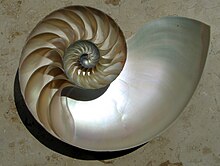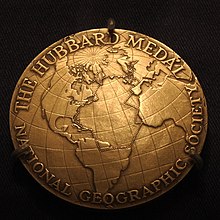Anne Morrow Lindbergh
Jump to navigation
Jump to search

Anne Morrow Lindbergh (22 June 1906 – 7 February 2001), born Anne Spencer Morrow, was a pioneering American aviator, and the wife of Charles Lindbergh
Quotes[edit]



- The punctuation of anniversaries is terrible, like the closing of doors, one after another between you and what you want to hold on to.
- Diary entry on the first anniversary of the kidnapping and death of her son Charles Augustus Lindbergh III (1 March 1932); later published in Locked Rooms and Open Doors (1974) ISBN 0156529564
- There are no signposts in the sky to show a man has passed that way before. There are no channels marked. The flier breaks each second into new uncharted seas.
- North to the Orient (1935) Ch. 1
- One can never pay in gratitude; one can only pay "in kind" somewhere else in life.
- North to the Orient (1935) Ch. 19
- Only in growth, reform, and change, paradoxically enough, is true security to be found.
- The Wave of the Future (1940)
- The wave of the future is coming and there is no fighting it.
- The Wave of the Future (1940)
- Lost time was like a run in a stocking. It always got worse.
- The Steep Ascent (1944)
- Dearly beloved — late again!
- Dearly Beloved (1962) First lines. ISBN 1556524900
- When the wedding march sounds the resolute approach, the clock no longer ticks, it tolls the hour…. The figures in the aisle are no longer individuals, they symbolize the human race.
- Dearly Beloved (1962)
- Him that I love, I wish to be
Free —
Even from me.- "Even—" (1966)
- I do not believe that sheer suffering teaches. If suffering alone taught, all the world would be wise, since everyone suffers. To suffering must be added mourning, understanding, patience, love, openness and the willingness to remain vulnerable. All these and other factors combined, if the circumstances are right, can teach and can lead to rebirth.
- Hour of Gold, Hour of Lead: Diaries and Letters of Anne Morrow Lindbergh, 1929-1932 (1973), p. 3
- I must write it all out, at any cost. Writing is thinking. It is more than living, for it is being conscious of living.
- Locked Rooms and Open Doors (1974)
- Charles was a stubborn Swede, you know, and he himself never felt the need to explain his feelings about where he stood and about past statements. But I feel free now to elaborate on his actual attitudes. He never wanted to be regarded as a hero or leader, and he never had political ambitions. His prewar isolationist speeches were given in all sincerity for what he thought was the good of the country and the world... He was accused of being anti-Semetic, but in the 45 years I lived with him I never heard him make a remark against the Jews, not a crack or joke, and neither did any of our children.
- On her husband, Charles Lindbergh, in The New York Times (20 April 1980)
- So dazzling was the spread of constellations that it had the impact of a vision, of some hidden insight. I drove home saying to myself: The dead, too, are like this, blazing within us — invisibly.
- As quoted in No More Words : A Journal of My Mother, Anne Morrow Lindbergh (2001) by Reeve Lindbergh, p. 41
The Unicorn in Captivity (1955)[edit]
- For a page with the entire poem online click here

In captivity,
Yet free.

Could escape them all —
If he rose,
If he chose.

With one toss of his mane,
If he chose to move,
If he chose to prove
His liberty.

Free hymn of love; His horn
Bursts from his tranquil brow
Like a comet born...
- Here sits the Unicorn
In captivity;
His bright invulnerability
Captive at last
- Here sits the Unicorn
In captivity,
Yet free.
- He could leap the corral,
If he rose
To his full height;
He could splinter the fencing light,
With three blows
Of his porcelain hoofs in flight —
If he chose.
He could shatter his prison wall,
Could escape them all —
If he rose,
If he chose.
- Here sits the Unicorn;
The wounds in his side
Still bleed
- Dream wounds, dream ties
Do not bind him there
In a kingdom where
He is unaware
Of his wounds, of his snare.
- Here sits the Unicorn;
Leashed by a chain of gold
To the pomengranate tree.
So light a chain to hold
So fierce a beast;
Delicate as a cross at rest
On a maiden's breast.
He could snap the golden chain
With one toss of his mane,
If he chose to move,
If he chose to prove
His liberty.
But he does not choose
What choice would lose.
He stays, the Unicorn,
In captivity.
- Yet look again —
His horn is free,
Rising above chain, fence, and tree,
Free hymn of love; His horn
Bursts from his tranquil brow
Like a comet born;
Cleaves like a galley's prow
Into seas untorn;
Springs like a lily, white
From the Earth below;
Spirals, a bird in flight
To a longed-for height;
Or a fountain bright,
Spurting to light
Of early morn —
O luminous horn!
- Here sits the Unicorn —
In captivity?
In repose.
- Forgotten the strife;
Now the need to kill
Has died like fire,
And the need to love
Has replaced desire
- Quiet, the Unicorn,
In contemplation stilled,
With acceptance filled;
Quiet, save for his horn;
Alive in his horn;
Horizontally,
In captivity;
Perpendicularly,
Free.
Gift from the Sea (1955)[edit]



- I … understand why the saints were rarely married women. I am convinced it has nothing inherently to do, as I once supposed, with chastity or children. It has primarily to do with distractions … Women's normal occupations in general run counter to creative life, or contemplative life or saintly life.
- Ch. 2
- I find I am shedding hypocrisy in human relationships. What a rest that will be! The most exhausting thing in life, I have discovered, is being insincere. That is why so much of social life is exhausting; one is wearing a mask. I have shed my mask.
- Ch. 2; part of this statement has often been paraphrased: "The most exhausting thing in life is being insincere."
- When one is a stranger to oneself then one is estranged from others too. If one is out of touch with oneself, then one cannot touch others.
- Rollers on the beach, wind in the pines, the slow flapping of herons across sand dunes, drown out the hectic rhythms of city and suburb, time tables and schedules. One falls under their spell, relaxes, stretches out prone. One becomes, in fact, like the element on which one lies, flattened by the sea; bare, open, empty as the beach, erased by today’s tides of all yesterday’s scribblings.
- The sea does not reward those who are too anxious, too greedy, or too impatient. To dig for treasures shows not only impatience and greed, but lack of faith. Patience, patience, patience, is what the sea teaches. Patience and faith. One should lie empty, open, choiceless as a beach — waiting for a gift from the sea.
- The shape of my life today starts with a family. I have a husband, five children and a home just beyond the suburbs of New York. I have also a craft, writing, and therefore work I want to pursue. The shape of my life is, of course, determined by many other things; my background and childhood, my mind and its education, my conscience and its pressures, my heart and its desires. I want to give and take from my children and husband, to share with friends and community, to carry out my obligations to man and to the world, as a woman, as an artist, as a citizen.
But I want first of all — in fact, as an end to these other desires — to be at peace with myself. I want a singleness of eye, a purity of intention, a central core to my life that will enable me to carry out these obligations and activities as well as I can. I want, in fact — to borrow from the languages of the saints — to live "in grace" as much of the time as possible. I am not using this term in a strictly theological sense. By grace I mean an inner harmony, essentially spiritual, which can be translated into outward harmony. I am seeking perhaps what Socrates asked for in the prayer from Phaedrus when he said, "May the outward and the inward man be at one." I would like to achieve a state of inner spiritual grace from which I could function and give as I was meant to in the eye of God.
- I believe most people are aware of periods in their lives when they seem to be "in grace" and other periods when they feel "out of grace," even though they may use different words to describe these states. In the first happy condition, one seems to carry all one’s tasks before one lightly, as if borne along on a great tide; and in the opposite state one can hardly tie a shoe-string. It is true that a large part of life consists in learning a technique of tying the shoe-string, whether one is in grace or not. But there are techniques of living too; there are even techniques in the search for grace.
- I have learned by some experience, by many examples, and by the writings of countless others before me, also occupied in the search, that certain environments, certain modes of life, certain rules of conduct are more conducive to inner and outer harmony than others. There are, in fact, certain roads that one may follow. Simplification of life is one of them.
- I mean to lead a simple life, to choose a simple shell I can carry easily — like a hermit crab. But I do not. I find that my frame of life does not foster simplicity. My husband and five children must make their way in the world. The life I have chosen as a wife and mother entrains a whole caravan of complications.
- By and large, mothers and housewives are the only workers who do not have regular time off. They are the great vacationless class.
- Good communication is as stimulating as black coffee, and just as hard to sleep after.
- Variant: Good communication is just as stimulating as...
- We must relearn to be alone.
- One cannot collect all the beautiful shells on the beach. One can collect only a few, and they are more beautiful if they are few.
- p. 114
Bring Me a Unicorn (1971)[edit]

- Bring Me a Unicorn: Diaries and Letters of Anne Morrow Lindbergh, 1922-1928 (1971) ISBN 0156141647



- I kept looking at the flowers in a vase near me: lavender sweet peas, fragile winged and yet so still, so perfectly poised, apart, and complete. They are self-sufficient, a world in themselves, a whole — perfect. Is that then, perfection? Is what those sweet peas had what I have, occasionally in moments like that? But flowers always have it — poise, completion, fulfillment, perfection; I only occasionally, like that moment. For that moment I and the sweet peas had an understanding.
- I saw standing against the great stone pillar — on more red plush — a tall, slim boy in evening dress — so much slimmer, so much taller, so much more poised than I expected. A very refined face, not at all like those grinning 'Lindy' pictures — a firm mouth, clear, straight blue eyes, fair hair, and nice color. Then I went down the line very confused and overwhelmed by it all. He did not smile — just bowed and shook hands.
- On first meeting Charles.
- We were high above fields, and there far, far below, was a small shadow as of a great bird tearing along the neatly marked off fields. It gave me the most tremendous shock to realize for the first time the terrific speed we were going at and that that shadow meant us — us, like a mirror! That "bird" — it was us.
- On her first flight.
- The feeling of exultant joy that there is anyone like that in the world. I shall never see him again, and he did not notice me, or would ever, but there is such a person alive, there is such a life, and I am here on this earth, in this age, to know it!
- On Charles.
- Don't wish me happiness — I don't expect to be happy; it's gotten beyond that, somehow. Wish me courage and strength and a sense of humor — I will need them all.
- Letter to Corliss Lamont on her engagement (1928)
- People don't want to be understood — I mean not completely. It's too destructive. Then they haven't anything left.
- I wonder why I bother to tell the truth when people ask me what I think of this and that and how I feel about this and that. I get so complicated and introspective that people often don't understand and are frankly puzzled and (naturally enough) bored. So why bother! It would be so much easier to say what they expected you to, and everything would be easy and pleasant.
- I want to write — I want to write — I want to write and never never never will. I know it and I am so unhappy and it seems as though nothing else mattered. Whatever I'm doing, it's always there, an ultimate longing there saying, "Write this — write that — write —" and I can't. Lack ability, time, strength, and duration of vision. I wish someone would tell me brutally, "You can never write anything. Take up home gardening!"
- It doesn't matter that it can't last, that we don't find it more often. To know that there is such perfection, that there has been such perfection — it is worth living for. It exists. It has been — it is. One can contemplate it and feel complete peace.
- I have come to believe that you can get along without anyone — that is, without the close contact of any one person. That is a terrible shock to me, but I think it is true. You do need companionship, but wherever you go, in whatever new environment, you will find people who, to a large degree, take the place of those you left...The intimate companionship goes, I think, when you leave a friend, but friendship stays. It is an inherent possibility of relationship that, once admitted — well, there it is.
War Within and Without (1980)[edit]
- Life itself is always pulling you away from the understanding of life.
- Marriage is tough, because it is woven of all these various elements, the weak and the strong. "In love-ness" is fragile for it is woven only with the gossamer threads of beauty. It seems to me absurd to talk about "happy" and "unhappy" marriages.
- I have been overcome by the beauty and richness of our life together, those early mornings setting out, those evenings gleaming with rivers and lakes below us, still holding the last light. … Those fields of daisies we landed on, and dusty fields and desert stretches. Memories of many skies and earths beneath us — many days, many nights of stars.
- Charles is life itself — pure life, force, like sunlight — and it is for this that I married him and this that holds me to him — caring always, caring desperately what happens to him and whatever he happens to be involved in.
- He was naming the groups that were pro-war. No one minds his naming the British or the Administration. But to name "Jew" is un-American — even if it is done without hate or even criticism. Why?

